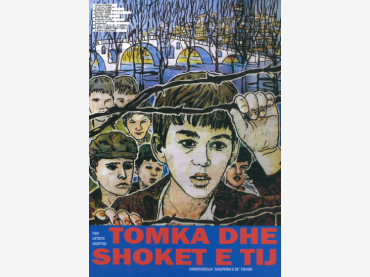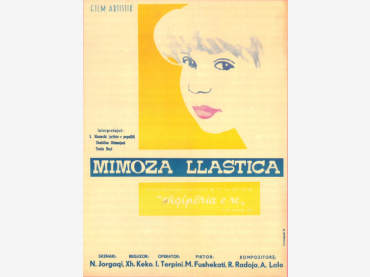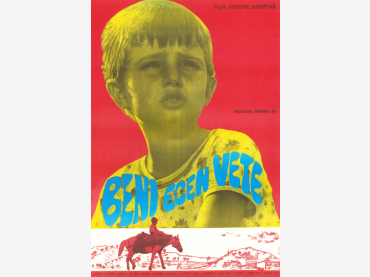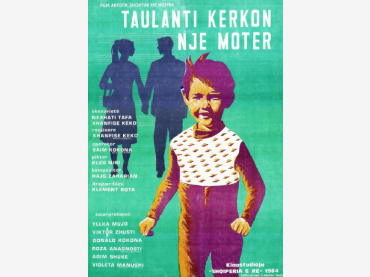-
Wednesday, 12 April 2023 – 7pm / Second session: Wednesday, 19 April 2023 – 7pm Sabatini Building, Auditorium
Xhanfise Keko. Tomka dhe shokët e tij (Tomka and His Friends)
Albania, 1977, b/w, original version in Albanian with Spanish subtitles, DA, 79’
Tickets― With a presentation in the first session by Chema González, head of the Museo Reina Sofía’s Cultural and Audiovisual Activities, and Denise Keko Andoni, the granddaughter of Xhanfise Keko and an active promoter of the film-maker’s legacy
Tomka and his friends play on a football pitch until, one day, the Nazis invade their town and use the field to store ammunition. The spectacle of war erases childhood play, but Tomka and his cohorts are unwilling to accept the situation and plot to recover this Nazi-occupied playing field. Keko uses the adventure to speak of partisan resistance in the Second World War on a historical level, as well as resilience in contemporary Albania under the hard-line Stalinist regime of Enver Hoxha. On the surface, a film, shot in black and white, that appears simple and naturalistic but possesses great poetic power.

-
Friday, 14 April 2023 – 7pm / Second session: Thursday, 27 April 2023 – 7pm Sabatini Building, Auditorium
Xhanfise Keko. Mimoza llastica (Fanciful Mimoza)
Albania, 1973, b/w, original version in Albanian with Spanish subtitles, DA, 42’
Tickets― With a presentation in both sessions by Ilir Keko, Xhanfise Keko’s son and a journalist on Albanian Radio and Television
Mimoza llastica (Fanciful Mimoza), part of a diptych with Kryengritje në pallat (Revolt in the Palace, 1972), is a surreal fable in which broken toys come to life and carry out a summary judgement on the two children who have destroyed them. Mimoza is a girl who doesn’t want to share her toys, ruins playground games and is known as the “spoiled brat”. However, she starts to feel lonely and notices that she misses the joy that comes with playing in a group. Regretful, Mimoza begins a transformation until she re-joins the group of friends and they all play together in the playground. This depiction of bad manners sits alongside desolate visions of the contemporary city and features powerful portraits through the masterly editing Keko learned in Moscow between 1950 and 1952.

-
Saturday, 15 April 2023 – 7pm / Second session: Friday, 28 April 2023 – 7pm Sabatini Building, Auditorium
Xhanfise Keko. Beni ecën vetë (Beni Walks on His Own)
Albania, 1975, b/w, original version in Albanian with Spanish subtitles, DA, 78’
Tickets— With a video presentation in both sessions by Thomas Logoreci, editor, producer and writer, and a co-founder of The Albanian Cinema Project, a platform for the conservation and dissemination of Albanian cinema
Beni’s overprotective parents don’t let him play in the street and he loses touch with daily life. His uncle comes from his village to rescue him and take him back there to spend the summer holidays. Beni subsequently connects with nature and gradually returns to real life in this tale of personal growth and transformation. Beni is played by Herion Spiro Mustafaraj, a boy selected out of more than 4,000 seven- to eight-year-olds from state schools, making him a mythical figure in Albanian cinema. The film is also one of the most sensitive explorations of the need to protect childhood from the obligations and dependencies of the adult world.

-
Monday, 17 April 2023 – 7pm / Second session: Saturday, 29 April 2023 – 7pm Sabatini Building, Auditorium
Xhanfise Keko. Taulanti kërkon një motër (Taulant Wants a Sister)
Albania, 1984, colour, original version in Albanian with Spanish subtitles, DA, 75’
Tickets— With a video presentation in both sessions by Regina Longo, film historian, programmer and lecturer at Brown University, and a co-founder of The Albanian Cinema Project, a platform for the conservation and dissemination of Albanian cinema
Along with Kur po xhirohej një film (While Shooting a Film, 1981), which deals with divorce, Taulanti kërkon një motër (Taulant Wants a Sister) is another film in which Keko addresses controversial and taboo issues in Albanian society. In this instance, she shines a light on the large number of one-child families, particularly among the upper class. Taulant tries to convince his parents, two intellectuals, of his solitude. But with both unaware and unresponsive to his fixation, the boy decides to take charge of the situation, saving up and going to a maternity ward to buy a little sister. After producing this sensitive and satirical work, Keko was forced to stop making films due to health issues, leaving behind a film corpus aptly summed up in her own words: “The deeper you go into the world of children, the more you learn, regardless of previous experience. In their world, I always believe we are all apprentices”.

![Xhanfise Keko en el set de Beni ecën vetë [Beni camina solo], ca. 1975. Cortesía de Skandal Production](https://recursos.museoreinasofia.es/styles/large_landscape/public/Actividades/keko-general-snippet.png.webp)
Held on 12, 19, 26 Apr 2023
A number of pre-eminent film-makers like Jean Vigo, François Truffaut and Abbas Kiarostami have made films about childhood, but few have forged such a coherent body of work as Xhanfise Keko (Albania, 1929–2007). Keko, a peerless film-maker who made eleven fictional features between 1972 and 1984 in Albania, explored the challenges, frustrations and aspirations of children. This retrospective, the first in Spain and one of the few organised internationally, includes four of her — recently restored — films, screened in double sessions.
With an extraordinary sensibility, Keko depicted the world and point of view of children by giving their desires and psychology prominence. This means understanding childhood not as a transitional phase to another age but as a period in itself, respecting children’s independence exactly as René Schérer defined the philosophy of pedagogy. The film-maker worked with child non-actors, boys and girls selected expressly for her films who build relationships with professional actors. At the same time, her practice contributed to transforming the methodical work of the actor into a playful and spontaneous activity, in line with Lev Vygotsky’s theory of learning through play: scripts were always read by the child participants, without the supervision of adult tutors, and could later be re-written on the basis of their comments. Her film sets were an open space of play involving the whole crew; the filming, always swift, looked to adapt to children’s short attention spans; the camera, always placed at their height, respected the way they perceived the world. In short, a whole series of measures to ensure that childhood was not only a theme in the films, but also a creator.
Keko’s filmography, shaped by her status as a working woman in 1970s and 1980s communist Albania, had to navigate censorship and underwent strict regulations. Nevertheless, through the grammar of her film-making she was able to explore taboos and hugely controversial themes during those years, for example divorce in Kur po Xhirohej një film (While Shooting a Film, 1981); a society of only children in Taulanti kërkon një motër (Taulant Wants a Sister, 1984); or bad manners in the Albanian upper class in Mimoza llastica (Fanciful Mimoza, 1973) and Kryengritje në pallat (Revolt in the Palace, 1972). The fables and metaphors of a child’s world allowed her not only to overcome this censorship but also to represent, on-screen, the dreams of a different world for a new generation. Despite her achievements, Xhanfise Keko remains an obscure figure in the history of film — the reason behind this series taking place.
Curator
Chema González
Organised by
Museo Reina Sofía and NUMAX
Acknowledgements
Denise Keko Andoni
Más actividades
![Tracey Rose, The Black Sun Black Star and Moon [La luna estrella negro y negro sol], 2014.](https://recursos.museoreinasofia.es/styles/small_landscape/public/Obra/AD07091_2.jpg.webp)
On Black Study: Towards a Black Poethics of Contamination
Monday 27, Tuesday 28 and Wednesday 29 of April, 2026 – 16:00 h
The seminar On Black Study: Towards a Black Poethics of Contamination proposes Black Study as a critical and methodological practice that has emerged in and against racial capitalism, colonial modernity and institutional capture. Framed through what the invited researcher and practitioner Ishy Pryce-Parchment terms a Black poethics of contamination, the seminar considers what it might mean to think Blackness (and therefore Black Study) as contagious, diffuse and spreadable matter. To do so, it enacts a constellation of diasporic methodologies and black aesthetic practices that harbor “contamination” -ideas that travel through texts, geographies, bodies and histories- as a method and as a condition.
If Blackness enters Western modernity from the position of the Middle Passage and its afterlives, it also names a condition from which alternative modes of being, knowing and relating are continually forged. From within this errant boundarylessness, Black creative-intellectual practice unfolds as what might be called a history of touches: transmissions, residues and socialities that unsettle the fantasy of pure or self-contained knowledge.
Situated within Black radical aesthetics, Black feminist theory and diasporic poetics, the seminar traces a genealogy of Black Study not as an object of analysis but as methodological propositions that continue to shape contemporary aesthetic and political life. Against mastery as the horizon of study, the group shifts attention from what we know to how we know. It foregrounds creative Black methodological practices—fahima ife’s anindex (via Fred Moten), Katherine McKittrick’s expansive use of the footnote, citation as relational and loving labour, the aesthetics of Black miscellanea, and Christina Sharpe’s practices of annotation—as procedures that disorganise dominant regimes of knowledge. In this sense, Black Study is approached not as a discrete academic field but as a feel for knowing and knowledge: a constellation of insurgent practices—reading, gathering, listening, annotating, refusing, world-making—that operate both within and beyond the university.
The study sessions propose to experiment with form in order to embrace how ‘black people have always used interdisciplinary methodologies to explain, explore, and story the world.’ Through engagements with thinkers and practitioners such as Katherine McKittrick, C.L.R. James, Sylvia Wynter, Christina Sharpe, Fred Moten, Tina Campt, Hilton Als, John Akomfrah, fahima ife and Dionne Brand, we ask: What might it mean to study together, incompletely and without recourse to individuation? How might aesthetic practice function as a poethical intervention in the ongoing work of what Sylvia Wynter calls the practice of doing humanness?

Intergenerationality
Thursday, 9 April 2026 – 5:30pm
This series is organised by equipoMotor, a group of teenagers, young people and older people who have participated in the Museo Reina Sofía’s previous community education projects, and is structured around four themed blocks that pivot on the monstrous.
The third session gazes at film as a place from which to dismantle the idea of one sole history and one sole time. From a decolonial and queer perspective, it explores films which break the straight line of past-present-future, which mix memories, slow progress and leave space for rhythms which customarily make no room for official accounts. Here the images open cracks through which bodies, voices and affects appear, disrupting archive and questioning who narrates, and from where and for whom. The proposal is at once simple and ambitious: use film to imagine other modes of remembering, belonging and projecting futures we have not yet been able to live.

Remedios Zafra
Thursday March 19, 2026 - 19:00 h
The José Luis Brea Chair, dedicated to reflecting on the image and the epistemology of visuality in contemporary culture, opens its program with an inaugural lecture by essayist and thinker Remedios Zafra.
“That the contemporary antifeminist upsurge is constructed as an anti-intellectual drive is no coincidence; the two feed into one another. To advance a reactionary discourse that defends inequality, it is necessary to challenge gender studies and gender-equality policies, but also to devalue the very foundations of knowledge in which these have been most intensely developed over recent decades—while also undermining their institutional support: universities, art and research centers, and academic culture.
Feminism has been deeply linked to the affirmation of the most committed humanist thought. Periods of enlightenment and moments of transition toward more just social forms—sustained by education—have been when feminist demands have emerged most strongly. Awareness and achievements in equality increase when education plays a leading social role; thus, devaluing intellectual work also contributes to harming feminism, and vice versa, insofar as the bond between knowledge and feminism is not only conceptual and historical, but also intimate and political.
Today, antifeminism is used globally as the symbolic adhesive of far-right movements, in parallel with the devaluation of forms of knowledge emerging from the university and from science—mistreated by hoaxes and disinformation on social networks and through the spectacularization of life mediated by screens. These are consequences bound up with the primacy of a scopic value that for some time has been denigrating thought and positioning what is most seen as what is most valuable within the normalized mediation of technology. This inertia coexists with techno-libertarian proclamations that reactivate a patriarchy that uses the resentment of many men as a seductive and cohesive force to preserve and inflame privileges in the new world as techno-scenario.
This lecture will address this epochal context, delving into the synchronicity of these upsurges through an additional parallel between forms of patriarchal domination and techno-labor domination. A parallel in which feminism and intellectual work are both being harmed, while also sending signals that in both lie emancipatory responses to today’s reactionary turns and the neutralization of critique. This consonance would also speak to how the perverse patriarchal basis that turns women into sustainers of their own subordination finds its equivalent in the encouraged self-exploitation of cultural workers; in the legitimation of affective capital and symbolic capital as sufficient forms of payment; in the blurring of boundaries between life and work and in domestic isolation; or in the pressure to please and comply as an extended patriarchal form—today linked to the feigned enthusiasm of precarious workers, but also to technological adulation. In response to possible resistance and intellectual action, patriarchy has associated feminists with a future foretold as unhappy for them, equating “thought and consciousness” with unhappiness—where these have in fact been (and continue to be) levers of autonomy and emancipation.”
— Remedios Zafra

ARCO2045. The Future, for Now
Saturday 7, March 2026 - 9:30pm
The future, its unstable and subjective nature, and its possible scenarios are the conceptual focus of ARCOmadrid 2026. A vision of the future linked to recent memory, a flash of insight into a double-edged sword. This year's edition, as in the previous two, will once again hold its closing party at the Reina Sofia Museum. This time, the star of the show is Carles Congost (Olot, Girona, 1970), one of the artists featured in the new presentation of the Collections recently inaugurated on the 4th floor of the Sabatini Building.
Carles Congost, with his ironic and timeless gaze, is responsible for setting the tone for this imperfect future, with a DJ session accompanied by some of his works in the Cloister on the first floor of the Sabatini Building of the Museo on the night of Saturday 7 March.

27th Contemporary Art Conservation Conference
Wednesday, 4, and Thursday, 5 March 2026
The 27th Contemporary Art Conservation Conference, organised by the Museo Reina Sofía’s Department of Conservation and Restoration, with the sponsorship of the Mapfre Foundation, is held on 4 and 5 March 2026. This international encounter sets out to share and debate experience and research, open new channels of study and reflect on conservation and the professional practice of restorers.
This edition will be held with in-person and online attendance formats, occurring simultaneously, via twenty-minute interventions followed by a five-minute Q&A.